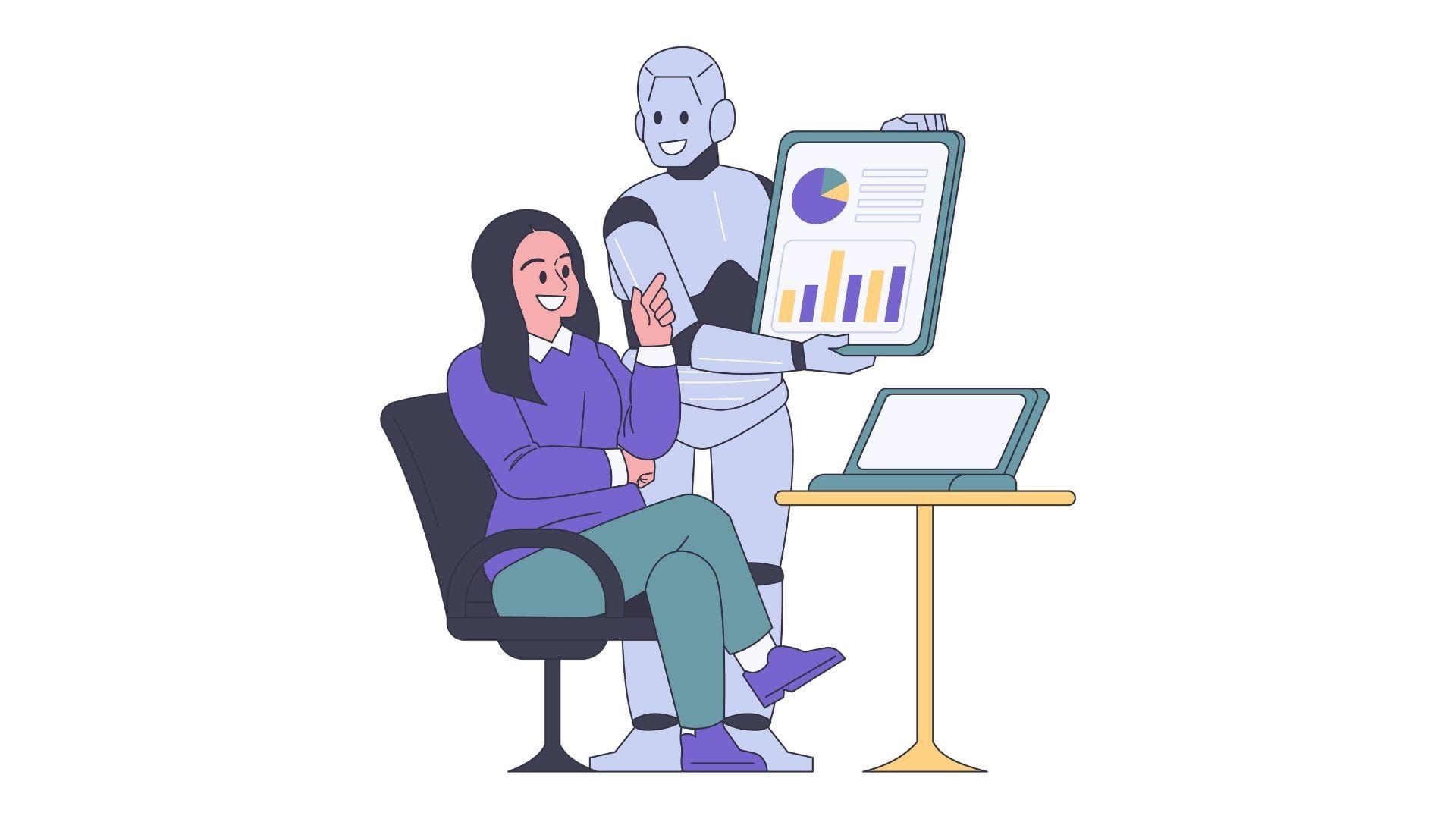How AI-Powered Marketing and Sales Reach New Heights with Generative AI
Explore how AI-powered marketing and sales reach new heights with generative AI, enhancing personalization, engagement, and growth in business strategies.

What if your sales calls could be more effective, driving more closed deals without demanding additional hours from your team? In today's fast-paced B2B environment, sales teams are increasingly burdened with non-revenue generating tasks like lead research, follow-ups, and administrative work.
AI-powered marketing and sales are poised to change this dynamic, making sales calls smarter and more impactful. With generative AI, sales teams can automate time-consuming tasks, personalize outreach at scale, and gain valuable insights to drive decision-making. According to Forbes, 80% of customer interactions will be powered by AI by 2025, transforming how businesses engage with prospects and customers.
This blog will explore how generative AI is helping sales teams optimize their processes, increase productivity, and close deals faster, allowing them to work smarter, not harder.
How Generative AI Drives Personalization in Marketing?
Generative AI is transforming the way businesses approach personalization in marketing by enabling dynamic, data-driven strategies that resonate with individual customer preferences. Through sophisticated algorithms and deep learning, AI can analyze vast amounts of data in real-time to craft tailored experiences, offering businesses the ability to engage each customer uniquely.
This level of personalization is more than just addressing customers by their first name; it's about delivering the right message, product, or service at precisely the right moment. The power of generative AI lies in its ability to continuously optimize and adapt to customer behavior, making marketing efforts not only more relevant but also more effective.
Here are some benefits of incorporating generative AI in marketing:
Personalized Content Creation at Scale
One of the most significant benefits of generative AI is its ability to create personalized content at scale. Unlike traditional methods where content needs to be manually tailored to each segment, generative AI allows businesses to automatically generate content that speaks to the specific needs and preferences of individual customers.
- Automated Content Generation: Generative AI enables the production of personalized emails, ads, social media posts, and landing pages without requiring additional manual input.
- Dynamic Adjustments: As AI continuously learns from customer interactions, it can adjust content in real-time, ensuring it remains relevant to each consumer.
- Consistency Across Channels: AI ensures that personalized content is seamlessly delivered across all channels, maintaining brand consistency while tailoring the message to different customer touchpoints.
Enhancing Customer Segmentation and Targeting
Generative AI plays a crucial role in enhancing customer segmentation and targeting, enabling businesses to refine their strategies with precision. By having access to vast amounts of customer data, AI can identify subtle patterns and trends that are not immediately visible through traditional analysis. This results in more granular and accurate customer segments, allowing businesses to focus their marketing efforts on the right audience with the right message.
- Advanced Data Analysis: Generative AI uses machine learning models to analyze historical customer behavior, demographics, and engagement data. This helps in creating segments that are not just based on surface-level characteristics but on deeper behavioral insights.
- Improved Targeting Accuracy: AI-powered segmentation increases targeting accuracy, leading to higher conversion rates. According to a report by McKinsey, businesses that implement advanced customer segmentation techniques see an average increase in revenue by 15%.
- Real-Time Adaptation: Generative AI doesn’t just create customer segments—it evolves them continuously. As customers interact with the brand, AI updates these segments in real time, ensuring that the marketing strategies are always aligned with the most current customer behavior.
- Predictive Targeting: AI’s predictive capabilities allow businesses to anticipate the needs of their customers before they even arise. This leads to proactive, rather than reactive, marketing strategies, which can boost engagement and loyalty.
The Impact of Generative AI on Increasing Sales
Generative AI is revolutionizing how businesses engage with customers and driving significant improvements in operational efficiency, revenue growth, and decision-making.
By automating complex tasks, enhancing customer experiences, and providing deeper insights, businesses can streamline their operations, increase profitability, and make more informed, data-backed decisions. This transformative potential has made generative AI a key enabler of business success in the digital age.
Here’s how generative is driving sales efficiency and bringing revenue growth:
Driving Sales Growth with Generative AI
Generative AI is revolutionizing the sales landscape by automating tasks, creating personalized customer experiences, and providing data-driven insights that empower sales teams to close deals faster. By automating repetitive tasks and enhancing personalization, AI is directly driving revenue growth and efficiency, making it a key tool in modern sales strategies.
Task Automation for Streamlined Sales Operations
Generative AI is streamlining sales operations by automating time-consuming processes such as lead generation, follow-ups, and content creation. This allows sales teams to focus on high-value tasks like building relationships and closing deals. According to a McKinsey report, automation can reduce operational costs by up to 30%, significantly boosting the efficiency of sales teams.
Personalized Sales Interactions at Scale
One of the most powerful applications of generative AI in sales is its ability to personalize customer interactions at scale. AI can create highly tailored email campaigns, product recommendations, and offers based on individual customer data. According to a study, 80% of consumers are more likely to make a purchase when brands provide personalized experiences, demonstrating the direct link between personalization and increased sales.
Improving Conversion Rates and Revenue Streams
Generative AI enhances conversion rates by delivering the right message to the right customer at the right time. By analyzing customer behavior and preferences, AI can generate content that resonates more deeply with potential buyers, leading to higher engagement and more conversions. Additionally, businesses using AI for personalized marketing have reported a 10-15% increase in customer retention, which directly impacts long-term revenue growth.
Boosting Decision-Making with Real-Time Insights
Generative AI provides businesses with real-time analytics and predictive insights, enabling sales teams to make more informed decisions. AI analyzes vast datasets and delivers actionable insights, helping businesses stay ahead of market trends and customer needs. By forecasting demand and optimizing inventory, AI ensures that businesses are always prepared to meet customer expectations and capitalize on emerging opportunities.
Optimizing Sales Strategies with Data-Driven Insights
AI-powered tools provide deep insights into customer behavior, trends, and purchasing patterns. This allows sales leaders to develop strategies backed by data, reducing uncertainty and improving the effectiveness of sales campaigns. With AI’s ability to analyze historical data, businesses can identify patterns and predict future trends, helping them refine their sales strategies for greater success.
Also Read: The Best 5 AI Sales Chatbots for Business in 2025
Ethical Considerations of Using Generative AI in Marketing and Sales
While generative AI offers transformative potential in marketing and sales, its adoption comes with several challenges and ethical concerns that businesses must navigate responsibly.
Data Privacy and Security Risks
Generative AI relies on vast amounts of customer data to deliver personalized experiences, raising concerns about data privacy. Improper data handling or breaches can lead to legal consequences and loss of consumer trust. Businesses must comply with regulations like GDPR and ensure robust data protection measures are in place.
AI Bias and Transparency
Generative AI models can inherit biases present in the data they are trained on, potentially leading to unfair or discriminatory marketing practices. Ensuring transparency in AI decision-making processes is crucial to maintain trust. Companies should regularly audit AI systems and implement checks to prevent biased outcomes.
Over-Reliance on Automation
While AI can automate many tasks, an over-reliance on automation may reduce the human touch that is essential for building authentic customer relationships. Striking a balance between AI-driven efficiency and human engagement is key to maintaining meaningful connections with customers.
Ethical Use of AI-Generated Content
Generative AI can create highly realistic content, including text, images, and videos, which raises questions about authenticity and accountability. Marketers must be mindful of the ethical implications of using AI to produce content that could mislead or deceive customers.
Also Read: AI SDR Sales: Building Trust in the Age of AI
The Future of Generative AI in Marketing and Sales
Generative AI is set to further transform marketing and sales by enhancing personalization, automating processes, and delivering powerful data-driven insights. The future holds significant potential for businesses that harness this technology to drive growth and efficiency.
- AI-Powered Customer Interactions: According to Gartner, by 2025, 85% of customer interactions will be powered by AI, enabling brands to deliver highly personalized experiences at scale.
- Increased Marketing ROI: A report by McKinsey suggests that AI could improve marketing ROI by up to 30% by optimizing targeting and automating customer interactions, helping businesses reach the right audiences more effectively.
- Enhanced Sales Automation: Reports predict that AI-powered sales tools will increase conversion rates by 20%, particularly by automating lead qualification and follow-up processes, allowing sales teams to focus on closing high-value deals.
Generative AI is not just about improving efficiency; it’s about creating tailored, meaningful experiences for customers at every touchpoint. As businesses continue to adopt generative AI, it will be crucial for them to adopt these technologies to remain competitive and drive growth.
Alisha SDR: The Next Step in AI-Powered Sales Development
As generative AI continues to shape the future of marketing and sales, solutions like Alisha SDR are leading the charge in sales development.
Key Features of Alisha SDR:
- Lead Generation: Alisha SDR automates the identification of high-potential leads, streamlining the sales pipeline.
- Hyper-Personalized Emails: AlishaSDR uses real-time data to craft personalized emails for each prospect, increasing engagement and response rates.
- Automated Follow-Ups: Alisha’s AI-generated responses ensure consistent communication with prospects, improving follow-up efficiency.
- Scheduling Automation: With integrated tools like Calendly and Google Calendar, Alisha SDR automates meeting scheduling, making it easier for sales teams to engage with prospects.
Also Read: AI Sales Calls: How AI Improves Outbound Sales In 2025
Conclusion
As AI-powered marketing and sales reach new heights with generative AI, businesses are presented with unprecedented opportunities to enhance personalization, optimize efficiency, and unlock new growth. The potential of generative AI to transform how we engage with customers and streamline operations is clear, making it an essential tool for future success.
The future of marketing and sales is rooted in embracing these dynamic technologies. Alisha SDR, powered by generative AI, is leading the way in helping businesses automate their sales processes, engage prospects more effectively, and ultimately drive growth.
Don’t miss out on the chance to elevate your sales development efforts. Discover how Alisha SDR can help your business harness the power of AI-powered marketing and achieve new levels of success today. Book a demo call today!


